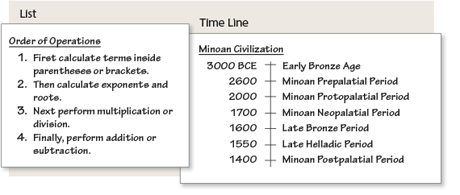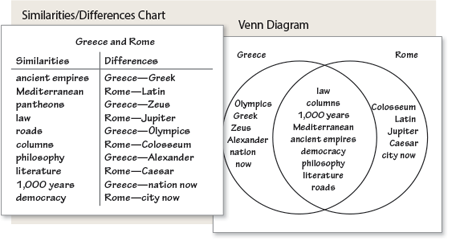Web page: Graphic Organizers, Thinkport
Web page: Graphic Organizers, WorksheetWorks.com
Web page: Graphic Organizers, BrainPOP
Understanding goes beyond simply remembering information. Understanding is knowing what something means, why it is important, and how it fits in with other ideas. Graphic organizers can help you understand a topic.
Sequencing information means putting it in time order, from first to last. A numbered list or time line can help you sequence details.

Your Turn Think of a process or period you are studying. Create a list or a time line that puts details in the proper sequence.
Classifying information means sorting it into groups or categories. A given category includes items that share a specific property or feature. For example, your class could be grouped according to gender, hair color, length of first names, favorite type of music, and so on. A table can help you sort categories.

Your Turn Think of a broad topic that can be sorted into groups or categories. Create a table like the one above to list your topic, categories, and examples.
Comparing means finding the similarities between two things. Contrasting means finding the differences between them. Comparing and contrasting helps you understand both topics better. You can compare two subjects using a similarities/differences chart or a Venn diagram.

Your Turn Choose two topics that you are currently studying and that display a number of similarities and differences. Compare and contrast the topics.
One way to thoroughly understand an event or situation is to trace its causes and effects. A cause-effect chart like the one below can help you explore a phenomenon. Write the name of the phenomenon in the central circle. On the left, write causes. On the right, write effects.

Your Turn Create a cause-effect chart to better understand a phenomenon you are studying.
Web page: Graphic Organizers, Thinkport
Web page: Graphic Organizers, WorksheetWorks.com
Web page: Graphic Organizers, BrainPOP
© 2014 Thoughtful Learning
